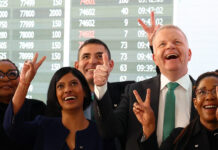
[miningmx.com] — THE stake of a poor North West tribe in Wesizwe Platinum has diminished substantially after Deutsche Bank took possession of 44 million shares the tribe held in the start-up platinum miner.
The Bakubung-ba-Ratheo community, who for centuries have inhabited the land where Wesizwe is constructing a platinum mine, originally owned 33% of the company when an empowerment deal was structured in 2004.
But through a series of intricate transactions, the tribe – whose land is situated near Sun City – is now left with just more than a 9% indirect shareholding in Wesizwe.
The JSE-listed mining firm this week voted in favour of a R6bn deal with a Chinese consortium to build the mine.
Some members of the community and its advisers are divided on whether the Bakubung ultimately benefited from their original equity in Wesizwe or not.
Deutsche Bank inherited the shares in December last year from Newshelf 925 – a special-purpose vehicle (SPV) housing the shares – after it failed to repay a R400m loan it received from the German bank in 2007.
The surrendering of the shares to Deutsche Bank comes at a time when the 33,000-strong tribe, which has the potential to be one of the wealthiest in South Africa, is searching for a reportedly “missing’ R500m.
Herman Bosman, the CEO of Deutsche Bank’s South African operations, confirmed on Friday that the lender now holds the 44 million shares that previously belonged to Bakubung.
“Deutsche Bank is currently a shareholder in Wesizwe Platinum. This is a result of both the Bakubung-ba-Ratheo community selling 44 million Wesizwe shares and an unrelated third party selling 26 million Wesizwe shares to a company called Newshelf 925 in 2007.
“Newshelf obtained financing from Deutsche Bank to pay the purchase price. In 2010, Newshelf could elect to either pay back Deutsche Bank in Wesizwe shares or in cash. Newshelf elected to pay in shares,’ Bosman said.
The R500m was part of the cash raised through borrowing R861m from Deutsche Bank and state-owned lender Industrial Development Corporation (IDC).
The community put up 117 million of its Wesizwe shares as collateral for the R500m it received from the two lenders.
The tribe, advised by Musa Capital, sold 44 million of the Bakubung’s shares to Newshelf, while the remaining 73 million shares were ring-fenced into two SPVs known as Hippo Mining Ventures and African Continental Resources Ventures.
Antoine Johnson, a Musa executive director, has denied that the tribe’s money was missing and maintains that Musa has disclosed in full to the tribe’s royal family, a government-appointed administrator running the community’s affairs, and to auditors and lawyers of Wesizwe how the R500m was reinvested.
DISPUTED
The disclosure was done following a Mafikeng High Court judgment which led to Musa and the Bakubung’s traditional council disclosing the whereabouts of the proceeds. But this is disputed by a Wesizwe board member.
The board member, who did not want to be named, said: “The matter is being handled by an arbitrator, Senior Advocate John Myburgh. So far, Musa is disclosing bits and pieces of information and half truths.
“We want full disclosure, which has not been forthcoming.’
But traditional council member and former representative of the tribe on Wesizwe’s board, DJ Phologane, said more than R100m of the Bakubung’s proceeds were placed in an escrow account with the IDC while the balance of the funds were reinvested in other sectors.
This includes investments in telecommunications, financial services, property, mining and consumer retails.
Johnson has dismissed suggestions that the community lost out on the Deutsche Bank deal.
“Deutsche lost money, not the community. The community hedged its bets very well because it got three times for its shares than what Wesizwe shareholders have today for their shares.’
Johnson said that from inception the transaction minimised Newshelf’s exposure to a fall in Wesizwe’s share price while it allowed Deutsche and Newshelf to split the fruits if the share price rose.
But Wesizwe shares tanked in the wake of the global financial crisis. When the Deutsche Bank deal was struck in 2007, the 70 million shares in Newshelf were financed to the tune of R400m, but are currently worth R164.5m.
Johnson said that even though the Bakubung had ceded some of its shares to Deutsche Bank, it remained a significant investor in Wesizwe through African Continental, which holds 9.23% of the company.
– City Press











